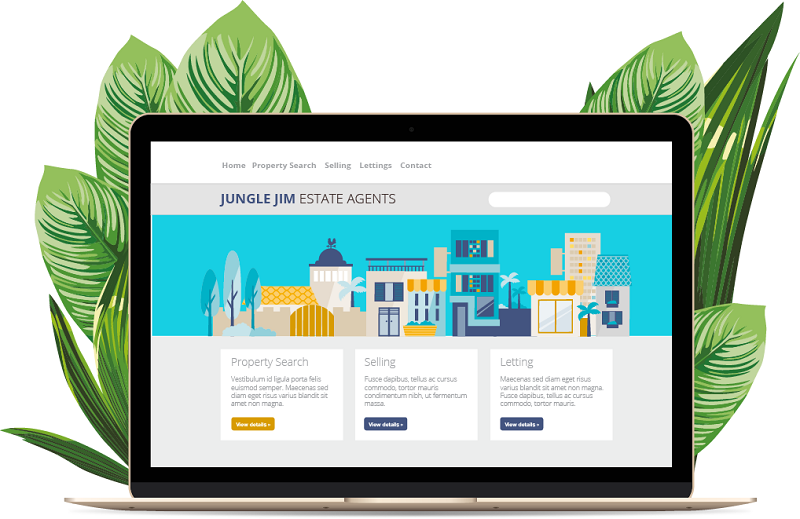
When you’re planning for one of, if not THE most important parts of your business, it pays to take advice from the right sources.
Having now delivered approximately 1,900 websites for estate agents over the last 15 years, The Property Jungle are the most experienced and trusted property website builders in the UK, so find out from us how to avoid the pitfalls and get the website you really want and need in our 5 Point Plan.
1. Check out the experience of a supplier’s customers
It sounds obvious, but it often doesn’t happen. Take references. Read testimonials. Find out who will be project managing the site build for you. Find out what their support and maintenance processes are.
How do they support you when you want to make changes before and after the site is launched? What has been the experience of their customers when they have wanted to make changes to their site? Was it expensive? Was it timely?
The big thing to remember is that launching your new website is not the end. It’s the beginning. You therefore need to understand if their customers got what they wanted, when they wanted it, for the price they expected to pay, both in the build and after it went live.
Phone them up and ask!
2. Check which software suppliers the website is compatible with
This is an area which is often overlooked and is a limitation of most non-property specialist web developers.
Every week we get calls from clients to advise us that they have changed their software provider or added a new one to their existing software systems.
We also know, from many examples of this happening, that ‘the local guy’, who perhaps offered a cheap WordPress theme, will often end up charging to develop a new feed reader when an agent changes software. This adds delay and significant and unexpected expense.
Specialist providers have usually already got tried and tested feed readers already built for all the main software providers and can often make the change in under 24 hours.
By asking the right questions up front you can make sure you understand the downstream ease of software change and the costs associated with them. Remember, you need to bake in future flexibility to your supplier choices.
3. Check out partners, owners and influencers
Web developers who are owned by software providers will always be limited in what they can offer you. They will always try to make you buy the product from their stable even if it is not necessarily the best option for you. Some of the larger ones even have internal sales/referrals as KPI’s.
You may find that they can be less flexible or affordable when you want to use different software. In the worst cases we’ve seen, an agent can lose their entire site if they change software and then have to start again.
This will never happen with an independent property web developer as they should be able to instantly work with any software you want them to work with.
From enquiry, you will also be able to find out if the web developer is able to put you in touch with best in class parallel technologies and not limit your choices to their own in-house systems. For example, instant valuations, 360° software systems, school acceptance areas etc.
4. Never just buy on price
Time – price – deliverable. These are the key measures of any successful project. Did I get what I wanted, when I wanted it, for the price I expected to pay?
We are frequently told of failed projects because the agent made the mistake of simply buying on price. The lowest price should never just get the deal.
Of course, you should try to get the best deal you can, but as a part of that make a condition of the deal be an agreed functional specification list, a planned delivery timescale and have an understanding of what downstream future maintenance and change costs are going to be.
Without this kind of planning, you are simply setting off in the hope it will work out rather than confidence that it will.
5. Don’t get tied into long-term contracts
Let’s be clear about this. The only company that benefits from a long-term contract is the web developer. They have certainty of income for the period, often one or even two years, which helps them hugely if they want to sell up or raise investment.
There is no technological reason at all why an agent will benefit from signing a contract which has anything longer than a 30-day notice period.
30 days is just courtesy. 730 days is 700 days too long and stops you from being able to control the destiny of your website for that period.
If you follow these simple checks and balances when deciding on which company to partner with for your website, we are sure that you will have a great long-term experience.
And one final tip to keep in your mind. The total cost of ownership is not the headline price you think you are going to pay. It includes the cost to your business of being locked-in, of not being able to make changes, of having to pay too much to make changes.
Want to know more or would like a confidential chat about your property website requirements? Get in touch today!
Search Jungle Drums
Categories:
- Finance & Mortgages 9
- Legislation & Compliance 24
- News from The Jungle Drums 132
- Portfolio 1
- Property Market 57
- Proptech & Innovation 72
- Sales & Marketing 95
- Uncategorized 14